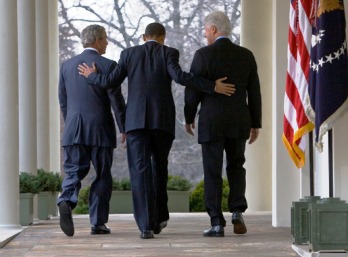On Tuesday (Jan. 12) the Republic of Haiti was overwhelmed by a 7.0 earthquake. Last Saturday, (Jan. 17) Washington seemed overwhelmed by another event – former Presidents George W. Bush and Bill Clinton joined President Obama to support a massive effort to aid the desperately poor Haitian people.

The New York Times reported that “The three men, who have collectively occupied the White House for the past 17 years, stood side by side in the Rose Garden to announce the effort [to organize a relief effort for Haiti]… A letter on the new Web site… asks for donations and promises to “channel the collective good will around the globe to help the people of Haiti rebuild their cities, their neighborhoods, and their families.”
On NBC’s Meet The Press Sunday, host David Gregory asked Clinton a question that repeatedly comes to my mind during every similar disaster.
“Why does it take a disaster of this scale and magnitude,” Gregory asked, “to create this kind of bipartisanship?”
“Well,” Clinton said, “I think that when something like this happens inside the United States we act in the same way. I think that it reminds us of our common humanity. It reminds us of needs that go beyond fleeting disagreements. Whatever our policy disputes are don’t seem to matter much when people are dying and hungry and sick. And I think it’s just a natural human response. Just as people’s disagreements are natural human response and, in normal times, can be healthy. It wouldn’t be healthy for America if, in normal times, we had no political debates. And it would be perverse if, in a time like this, we let lesser matters keep us from joining hands.”
I don’t think anyone doubts the rationale of healthy, political debate, but the fear and anger the country currently finds itself in the grip of has exceeded anything healthy. Rather, it seems to to be a continuation of the same partisan rhetoric, political brinksmanship and cynicism fueled by the same entrenched thinking that perpetuates an Us vs. Them mindset.
As of this writing, Massachusetts Republican Scott Brown has won election to the U.S. Senate seat held for more than 40 years by Ted Kennedy. While Democrats are concerned with the loss of the so-called “super majority” in the Senate, they should instead, recognize a genuine opportunity for change.
Both parties must now work together to solve the nation’s issues. Both need to recognize that disillusionment by voters means that there are no more long-term contracts in Congress. Both need to bury the partisanship and resurrect the kind of statesmanship that voters want and need; the kind that will “channel the collective good will…” for the benefit of all.
Comments










